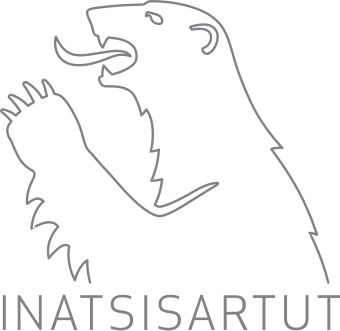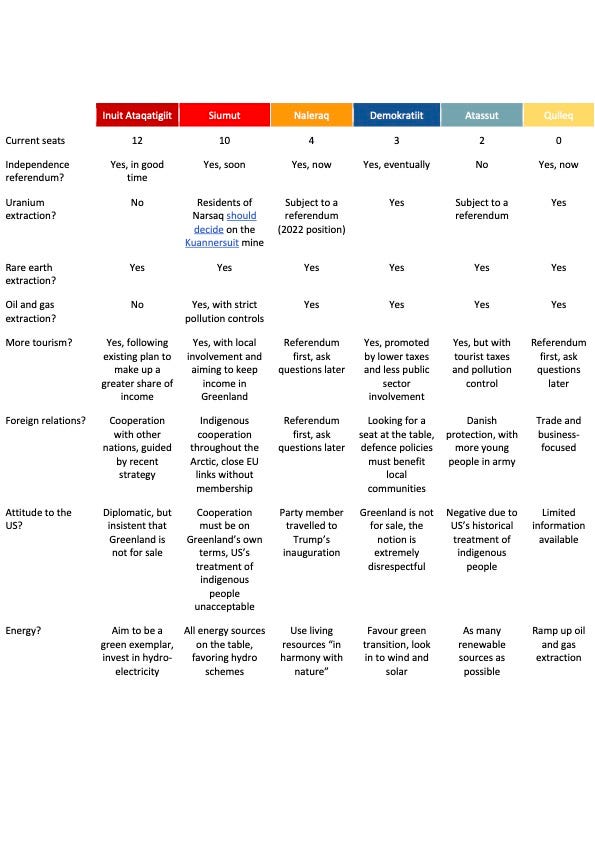The next election in Greenland is scheduled for March 11th, when the 31 members of the Greenlandic parliament, Inatsisartut, will be elected.
With international interest higher than ever before, and all parties responding to Donald Trump’s provocations, what would the different parties do if elected? How would they shape Greenland’s attitude to the world, and the world’s attitude to Greenland? Here is a brief guide to these questions and more, largely based on a recent interview with Rasmus Leander Nielsen, Associate Professor at the University of Greenland, on the Polar Geopolitics podcast.
Inuit Ataqatigiit (IA). Leader: Múte B. Egede
The current largest party in the Inatsisartut, Inuit Ataqatigiit [Community of the People], was founded in 1978 as one of Greenland’s original political parties, and is the most left-wing of the six contesting this election. Domestically, IA aims to fight inequality through state intervention. They are against uranium mining and oil and gas extraction but in favour of rare earth mining if done responsibly, and want to invest in tourism as a key growth industry. Having formerly been highly pro-independence, they have not committed to triggering an independence referendum within a set time frame, and instead favour gradual progress towards self-sufficiency.
Siumut. Leader: Erik Jensen
Another original party, and the main historical power in the Inatsisartut, Siumut [Forward] have been in coalition with IA since 2021, after only their second election defeat. A social democratic party, Siumut has long been pro-independence but only recently stepped up the rhetoric, stating their desire to use Article 21 of the 2009 Self-Government Act to begin negotiating full independence, with a referendum before the next election if they win this time around.
Naleraq. Leader: Pele Broberg
A pro-independence splinter from Siumut, formed in 2014, Naleraq [Point of Orientation] are the strongest advocates for independence as soon as possible, and more of a single-issue party than many of the others. Domestically, their focus was primarily on supporting smaller scale hunting and fishing, before the recent arrival of more liberal members. Pele Broberg made headlines in 2024 for suggesting Greenland’s two representatives should be removed from the Danish parliament (Folketing), because their purpose is “to support Denmark’s actions as if it had never been a coloniser”. They have recently been boosted by a series of high-profile defections, two of which were from Siumut:
Aki-Matilda Høegh-Dam As Siumut’s representative in the Danish parliament, she attracted international media attention in October 2024 for refusing to translate a speech from Greenlandic in the Folketing, against protocol.
Kuno Fencker Aki-Matilda Høegh-Dam’s fiance, he was elected in 2021 as an alternate for Siumut when other candidates were elevated to serve as ministers, having gained 66 votes. He traveled to the United States for Donald Trump’s inauguration, where he met with Rep. Andy Ogles (R-TN), who introduced the ‘Make Greenland Great Again’ bill to congress.
Vittus Qujaukitsoq Former Minister of Finance (2013-14; 2018-2021) and Minister of Foreign Affairs (2014-17). He contested the 2018 parliamentary election with his own pro-independence party Nunatta Qitornai [Separatists], gaining one seat which he subsequently lost in 2021. He stirred up controversy in 2016 with remarks criticising Danish “arrogance” and welcoming Donald Trump’s first election in the hope that he would appoint a private sector veteran as secretary of state, “for the sake of our Arctic region”.
Demokraatit. Leader: Jens Frederik Nielsen
A liberal or social liberal splinter from Siumut, formed in 2002, Demokraatit [The Democrats] are business-focused and private sector friendly. They lobby for lower taxes and limited state involvement in private enterprise, but continued state ownership of vital utilities and provision of free healthcare and education. Demokraatit are in favour of resource extraction, and see independence as the ultimate goal, to be achieved gradually.
Atassut. Leader: Aqqalu Jerimiassen
The third of Greenland’s original parties, Atassut [Solidarity] is its most conservative, and, after a period in support of independence, has returned to lobbying to preserve and modernise Greenland’s connection to the Kingdom of Denmark. Atassut is against state involvement in the economy and society, and in favour of increasing personal responsibility, with lower taxes across the board.
Qulleq. Leader: Karl Ingemann
Founded in 2023, Qulleq [Oil Lamp] only attained the signatures required to contest this election on the 7th of February 2025. The party aims for independence as soon as possible, whereupon Greenland can make the most of its resources, ramping up oil and gas extraction and modifying the recent Fisheries Act.











